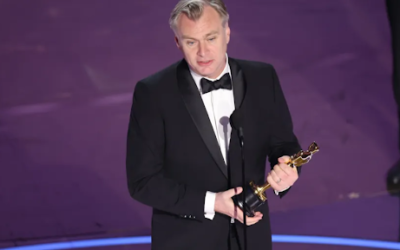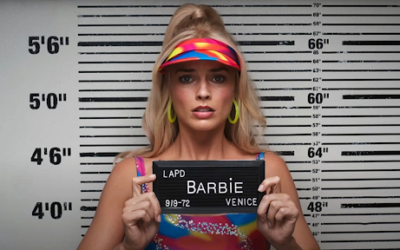Blanchett, middle, with fellow jury members Nicola Lagioia, Joanna Hogg, Veronika Franz, Matt Dillon, Ludivine Sagnier and Christian Petzold. Photograph: Yara Nardi/Reuters
Although the COVID-19 pandemic continues throughout the United States, the rest of the world has been much more effective in returning to their prior pre-pandemic states, and no industry is quite as enthusiastic about making a comeback than the film industry. With the release of Christopher Nolan’s “Tenet” in a majority of international markets during the previous weekend (with a domestic release set to begin this coming Labor Day weekend in theaters that aren’t currently mandated by state governments to be closed), major studios are looking to the big-budget blockbuster to determine whether or not the time has come to resume wide release of the year’s most anticipated and expensive productions. Perhaps more significant, however, is the beginning of the international film awards season, set to commence on Wednesday, September 2nd with the opening of the Venice International Film Festival.
As the first festival of the season, there is plenty of attention being placed upon this long-standing institution, especially in the wake of a global epidemic that has put much of the industry on hold. The Cannes Film Festival, considered by many to be one of cinema’s most prestigious events, was one such festival that had to be cancelled as a result of the pandemic, so many are now looking to Venice as a means of determining which of the year’s releases will emerge as contenders for the industry’s various awards.
As a sign of unity in such turbulent and frustrating times, the opening ceremony of the Venice Film Festival will see the directors of many of the festivals that had to be cancelled due to Coronavirus concerns, most notably the Cannes Film Festival, take the stage and welcome the film industry and the various individuals involved back to the world of cinema. As stated by festival director Alberto Barbera, the main focus of the ceremony will be to reach out to those most affected by the pandemic, “especially to express our support for the industry and for filmmakers, talents, and exhibitors who have suffered the most”.
Although the pandemic has been effectively subdued throughout most of the world outside the United States, the organizers of the Venice Film Festival have gone to great lengths to ensure that there is as little contribution to a potential second outbreak as possible. Indeed, several measures have been put into place in order to reduce the possibility of further spread of the disease. Some of these measures are fairly expected compared to other businesses that have enforced anti-COVID regulations, others are a bit more unique to the festival. Either way, the festival claims to be doing everything in its power to prevent new Coronavirus cases.
Among the practices being put into place, according to Barbera, most notable is the establishment of multiple swab test locations for people that are arriving at the festival from places outside the European continent (as well as some European nations such as Spain). One of these locations will be at the Venice Airport, which is expected to screen and test over three hundred festival attendees over the festival’s first few days. In addition, thermo-scanners have been set up throughout the festival’s many entry points, and screening venues and press conferences have been arranged to enforce social distancing among the filmmakers and reporters attending the festival.
The achievement that Barbera and the festival organizers are most proud of, however, is what they are referring to as a complete reinvention of the red carpet experience. Said reinvention involves a large barrier that separates the red carpet and those walking down it from those standing outside the carpet. The barrier, Barbera notes, is intended to provide additional space for photographers who wish to maintain social distancing while also reducing the risk of fan gatherings that could potentially contribute to the spread of disease. According to Barbera, his biggest concern is the “fan frenzy” that tends to occur when celebrities and other prominent figures stroll down the red carpet, and the barrier being put in place will hopefully keep such frenzy to a minimum. The red carpet event will be broadcast and streamed live through various television and Internet platforms, but fans will otherwise have little to no access to those who are set to make an appearance.
No expense is being spared when it comes to assuring festival attendees that their health and safety is not something to worry about, which should come as a relief for those whose films are set to make their big debut at the Venice Film Festival. Opening the festival is the marriage drama “Lacci (The Ties)” from Italian director Danielle Luchetti, marking the first time in over a decade that an Italian film has opened the festival. Among the other European talents set to showcase their work at the festival are Hungarian-born Kornel Mundruzco with his film “Pieces of a Woman”, as well as Norwegian-American Mona Fastvold with “The World to Come”. Outside Europe, two cinematic achievements from Mexico are set to premiere: “Nueva Orden” from director Michel Franco, and “The Human Voice”, a half-hour film helmed by Pedro Almodovar and starring acclaimed actress Tilda Swinton. Then there’s the presence of American film at the festival, with the highlights including Regina King’s directorial debut “One Night in Miami” and Chloe Zhao’s “Nomadland” starring Frances McDormand.
Can the organizers of the Venice Film Festival run things smoothly under these new anti-COVID measures? Will the potential success of the festival encourage future festivals to impose similar measures? Nothing is set in stone as of yet, especially when it comes to something as unpredictable as a pandemic, but hopefully, the events of the Venice Film Festival will be pulled off without a hitch, therefore becoming a sign of optimism for all the film festivals to come.




